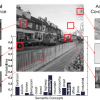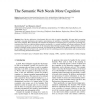1082 search results - page 55 / 217 » Learning the Semantic Meaning of a Concept from the Web |
ALT
2006
Springer
14 years 4 months ago
2006
Springer
e-Science is scientific investigation performed through distributed global collaborations between scientists and their resources, and the computing infrastructure that enables this...
CVPR
2009
IEEE
15 years 3 months ago
2009
IEEE
We present a simple framework to model contextual
relationships between visual concepts. The new framework
combines ideas from previous object-centric methods
(which model conte...
WCE
2007
13 years 9 months ago
2007
act—Ontological concept evaluation is a difficult task. Till now, it is done either by domain expert or a knowledge base (thesaurus, ontology, etc.). In this research, we propose...
SEMWEB
2010
Springer
13 years 2 months ago
2010
Springer
One of the key deficiencies of the Semantic Web is its lack of cognitive plausibility. We argue that by accounting for people's reasoning mechanisms and cognitive representati...
WEBDB
2004
Springer
14 years 1 months ago
2004
Springer
Current approaches for answering queries with imprecise constraints require users to provide distance metrics and importance measures for attributes of interest. In this paper we ...


